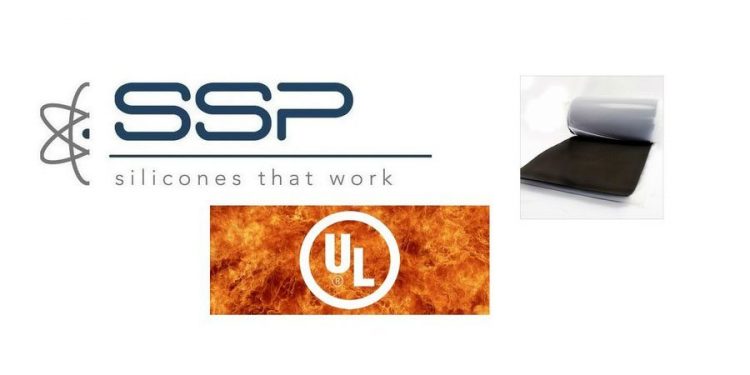GORE EMI shielding alternatives from SSP can be used instead of discontinued GORE GS2100 and GS5200.
Specialty Silicone Products (SSP) has technical data sheets (TDS) and an outgassing report for SSP-502-40-V0 and SSP-502-60-V0, alternatives to discontinued GORE® EMI gasket materials.
Several years ago, W.L. Gore distributed an end-of-life notification about GORE® GS2100, GS5200, and GS8000, flame-resistant materials for EMI shielding and gasketing. SSP is now filling this gap in the marketplace and sharing technical data that former buyers of GORE® EMI materials can use to specify replacements.
SSP-502-40-V0 and SSP-502-60-V0 are 40-durometer and 60-durometer EMI/RFI silicones that are filled with nickel-coated graphite particles. They combine very good electrical conductivity with reliable shielding against electromagnetic interference (EMI) and radio frequency interference (RFI).
Both of these SSP elastomers meet UL 94 standards for flammability and an ASTM standard for outgassing. They are part of SSP’s broad product line of conductive silicones for EMI gasketing applications.
GORE EMI Shielding and Flame Resistance
SSP has been making flame-retardant, nickel-graphite filled EMI silicones for over a decade. Older TDS for SSP-502-40-V0 and SSP-502-60-V0 explained that these materials meet the vertical burn testing requirements for UL 94 V1, part of the larger UL 94 flammability standard. SSP’s new TDS for SSP-502-40-V0 and SSP-502-60-V0 show that these materials also meet requirements for UL 94 V0. Samples were validated by a third-party testing lab and a report is available upon request.
For former buyers of GORE® EMI gasket materials, it’s important to understand that SSP-502-40-V0 and SSP-502-60-V0 are not new formulations. These proven SSP materials have been used for years in critical applications such as defense, aerospace, and telecommunications. The addition of UL 94 V0 flammability testing underscores our confidence in a product that we can develop quickly while leveraging over a decade’s worth of formulation data.
ASTM E595 Outgassing
SSP-502-40-V0 and SSP-502-60-V0 also meet the requirements of ASTM E595, a standard that defines testing procedures for evaluating changes in material mass caused by outgassing. SSP offers many similar EMI elastomers that meet the ASTM E595 standard for total mass loss (TML), so we were confident that both SSP-502-40-V0 and SSP-502-60-V0 were within allowable limits for TML and collected condensable material (CVCM). An independent report from a third-party testing laboratory confirms that they are.
As the report explains, samples of SSP-502-40-V0 and SSP-502-60-V0 were tested both with and without a conductive pressure-sensitive adhesives (PSA) that SSP can apply to one side of the gasket materials for ease-of-installation. A test for SSP-502-40-V0 with the conductive PSA yielded a slightly higher outgassing result than recommended, so SSP will work to reduce PSA outgassing with this particular product. A test of PSA-502-60-V0 with the PSA provided outgassing results under the recommended limit.
SSP Replacements for GORE® GS2100 and GS5200 EMI Gasket Materials
SSP provides SSP-502-40-V0 and SSP-502-60-V0 as pressed sheets and in continuous rolls that are ready for converting and fabricating. These ultra-thin materials are available with a thickness as small as 0.10” and are Made in the USA in Ballston Spa, New York. SSP is an ISO 9001:2015 certified company with an in-house laboratory and growing production capabilities that include recent equipment investments.
As the TDS for SSP-502-40-V0 explains, this 40-durometer silicone is recommended as a replacement material for GORE® GS2100, a carbon-filled cellular PTFE with a 45-durometer hardness that meets UL 94 V0. The TDS for SSP-502-60-V0 describes how this 60-durometer SSP shielding silicone is recommended as a replacement for GORE® GS5200, a nickel-filled 60-durometer cellular PTFE that meets UL 94 V-0.
To learn more about SSP’s offsets for discontinued GORE® EMI gasket materials, contact SSP on-line or email Dominic Testo.





